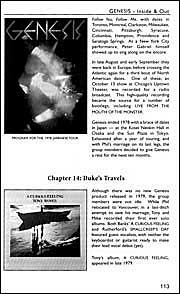- Article
- Read in 3 minutes
Genesis – Robin Platts: Inside & Out – Buch Rezension
Robin Platts published a compact biography about Genesis in 2001. Volker Stöckemann had a closer look at it …
There are many ways to write a book about Genesis.
You can produce the ultimate fan bible (Armando Gallo). You can write something that only publishers known for their mediocre programme will publish. You can begin to pour forth your impressive knowledge and combine it with extreme ambitions for your work and still get lost somewhere (Alan Hewitt). You can also take the easy way out and provide every track from every album with a commentary that is at times very fitting and at times abstruse (Chris Welch).
Or you can write a book that is not spectacular, but a consistent effort and an easy read. That’s what Robin Platts has managed to do very well with his book Inside And Out.
While the author did not have any new insights or own interviews with Mike, Tony, Phil or Peter, he still makes do with what he has. He plays it safe by giving us a history of the band in a well-structured chronological order.
When the reviewer began to read he had these odd impressions of déjà vú and he had to check the cover to reassure himself that the book is not by Armando Gallo.
 Robin Platts gives us a large number of interesting quotes that are well-chosen and insightful. He also adds a couple of amusing anecdotes like the story that the band almost named their 1977 album after a New York Chinese restaurant “The House Of The Four Winds” instead of Wind & Wuthering. “… that’s what happens to you when you grow up – you realize that maybe you shouldn’t go around naming albums after restaurants!” (Steve Hackett). Or the story of Phil Collins’ ten-second version of Supper’s Ready on his 1982 solo tour (A flower? – Six-six-six – Jerusalem).
Robin Platts gives us a large number of interesting quotes that are well-chosen and insightful. He also adds a couple of amusing anecdotes like the story that the band almost named their 1977 album after a New York Chinese restaurant “The House Of The Four Winds” instead of Wind & Wuthering. “… that’s what happens to you when you grow up – you realize that maybe you shouldn’t go around naming albums after restaurants!” (Steve Hackett). Or the story of Phil Collins’ ten-second version of Supper’s Ready on his 1982 solo tour (A flower? – Six-six-six – Jerusalem).
The eras and albums are presented in a very balanced way. Solo careers are only briefly mentioned. Anthony Phillips’ work receives warm appreciation but he is not (as Hewitt does) given more space than is his due. The descriptions of songs and tours are as they should be.
There is no reason for complaint about the choice of photos (mostly black-and-white images accompanying the text and eight full-colour pages in a centre block). Well-known photos are mixed with rare images of bootlegs, rare album covers, tour programmes and other memorabilia. If you always wanted to find out what Mick Barnard looked like at the time, you can find his picture and some of his recollections on page 35.
 The appendix containing the discography is also a solid work. It lists UK albums, UK and US singles along with a selection of interesting foreign samplers and bootlegs, track listings always included. If you would like more information about that you might want to turn to Alan Hewitt’s book and/or Max Demonts almost complete singles discography Counting Out Time.
The appendix containing the discography is also a solid work. It lists UK albums, UK and US singles along with a selection of interesting foreign samplers and bootlegs, track listings always included. If you would like more information about that you might want to turn to Alan Hewitt’s book and/or Max Demonts almost complete singles discography Counting Out Time.
There are very few actual mistakes: As far as the chronicler knows, ELP and Rick Wakeman were never signed to Charisma, Phil Collins’ audition took place at Gabriel’s, not Rutherford’s place, and the fact that the term “East Berlin” had seriously gone out of fashion with the demise of the GDR apparently had not yet reached Burlington (home of the socks brand?) in 1998.
A serious shortcoming of the book is the fact that the sources of photos and quotes are hardly ever given. This is an omission that professional reviewers do not take kindly at all. The writer of these lines is not a friend of footnotes, long appendices or pseudo-scholarly apparatus critici, but he would have wished for more diligence in that department.
Platts makes up for it with his very sensitive account of the band’s final break-up. The reviewer has had a hard time getting over the (preliminary? Never give up the hope) end of Genesis. But the final pages of the book and particularly the words of Tony Banks make it a bit easier: “If we got together, even for those who liked us, it would be a major disappointment. Most revivals are. And that’s one good reason for avoiding them.”
This book, all in all, won’t become a standard item for Genesis fans, but it makes for some good reading; it’s not a must-have, but it sure is no waste of money. I know what I like – and I like it.
by Volker Stöckemann
translated by Martin Klinkhardt

